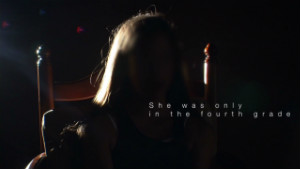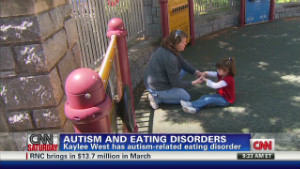Editor's note: In the Human Factor, we profile survivors who have overcome the odds. Confronting a life obstacle -- injury, illness or other hardship -- they tapped their inner strength and found resilience they didn't know they possessed. This week we introduce you to Chelsea Roff, who had a stroke at 15 brought on by her severe anorexia. At the time she arrived at Children's Medical Center Dallas, she weighed 58 pounds. Now 23, Roff is a writer, speaker and yoga instructor.
(CNN) -- The first emotion I remember is rage. It was a violent, fire-in-your-veins, so angry-you-could-kill-someone kind of rage.
I wanted out. I wanted the pain to be over. I wanted to die. I was mad at myself for not having the courage to just do it quickly, angry at the hospital staff for thwarting my masked attempt.
I was convinced that I was "meant to" endure this, that my long, drawn-out starving to death would prove my willpower to God. In the days prior to my stroke, I'd had vivid hallucinations -- of Jesus on a wooden cross outside my bedroom window and a satanic figure sneaking up under my bedroom covers to suffocate me at night. I thought I was meant to be a martyr. I thought God wanted me to die.
As the fury subsided, delirium set in. I became confused, defiant and completely irrational. I told the doctors that they couldn't possibly keep me overnight, because my family didn't have insurance or money to pay. When a cardiologist responded that she wasn't sure if I'd live another week, I told her she was full of s---.
 Tracey Gold's new show
Tracey Gold's new show  Increase in eating disorder among kids
Increase in eating disorder among kids  Autism and eating disorders
Autism and eating disorders I hid the food they were trying to make me eat in my underwear, in flowerpots, even in my cheeks like a chipmunk -- certain no one would notice. I didn't want to get better. I was convinced nothing was wrong.
I remember having nurses turn me over in the middle of the night to tend to the bed sores on my behind, places where the skin was so thin that my tailbone was starting to protrude through the flesh.
I remember waking up to discover I'd wet the bed nearly every morning for the first three months I was hospitalized. I was ashamed, disgusted. I'd lost control of the muscles in my bladder; I was like an infant all over again. I remember shooting a nurse the bird when she told me I couldn't walk, only to crumble to the floor when I angrily pushed the wheelchair away to give it a try.
A boy and his seizure dog
Unbeknownst to me at the time, my arrival at the hospital had launched an investigation by Child Protective Services back at my home in Austin. The caseworkers deemed my mother an "unfit parent" and my sister and I were placed under custodianship of the state. My care was left to the doctors and nurses at Children's, while my sister was sent to live with our godparents. My mother, herself an alcoholic and anorexic, had literally drunk herself into oblivion (she was later diagnosed with Wernicke's Syndrome, a form of alcohol-induced dementia).
I spent the next 16 months of my life in that hospital. I completed my junior and senior years of high school through a distance education program, talked my way through hundreds of hours of individual and group therapy and slowly, painfully worked to bring my body and mind back to life.
When Medicaid finally pulled the plug on funding for my treatment, I was unrecognizable from the day I'd walked in. I'd gained nearly 40 pounds, and the feisty, fiercely independent spirit I'd been known for as a child was on her way back in (close to) full force.
Although I was still significantly underweight and terrified to leave the security of the hospital, my medical team managed to convince the caseworkers to grant me emancipation. At 17, I re-entered the "real world" as a legally recognized adult.
My doctor at Children's helped me make arrangements to move into a garage apartment with a close family friend near the hospital. I got a job at a local Starbucks, started applying for college, and, by the grace of who-knows-what, was offered almost free weekly therapy by a psychologist who'd treated me at Children's.
Three months later, I took my first yoga class. I was lucky. I was blessed. I was given enough resources to put the fragments of my broken life back together.
6 years later, burned Iraqi boy stands tall
My hope is that my story might serve as a beacon of hope for people grappling with their own inner demons in silence and isolation. Whether it's an eating disorder, abandonment, depression or addiction, please know:
There is a way out. You don't have to suffer alone. There are people out there who want to love you, who would be honored to bear witness to your pain. Healing doesn't happen in a vacuum. We are human and we have an inherent need to see and be seen, to touch and be touched. No one heals heartbreak alone.
For the broader community, I hope this story will diminish some of the stigma and misperceptions about eating disorders. Many of us have been taught that people with eating disorders simply want to be skinny, feel like they have to look like supermodels to be worth anything, or just have an unhealthy "need for control." Those are all symptoms of an eating disorder, not the cause.
I realized that I feel like a child who was once desperately thirsty, who was given enough water to survive and shake her thirst, and now feels compelled to go out and give water to anyone who's parched. "Look! Water! I know, isn't it good?! Drink up!!" When I see people drink the water, I can't even describe the feeling -- it's as if I'm experiencing the first sip all over again. It brings me incredible joy, even healing. It's an act of alchemy. It allows me to make light of some of the darkest days of my life.
I once had a therapist who, when asked how I could ever repay her for all she'd given me, told me: "Your life will be all the thanks I need." This is how I thank her. This is how I thank all those who helped me find my way out of the darkness. Share the water.
'On Looking;' The world you're not seeing
Portions of this article were originally published in the book 21st Century Yoga: Culture Politics and Practice and on Intent Blog, where Roff is managing editor.
{ 0 comments... read them below or add one }
Post a Comment